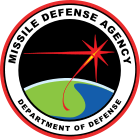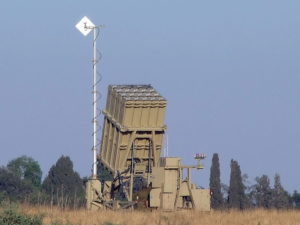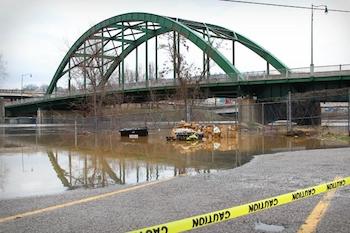
Ever since President Reagan spoke of a Star Wars defense system, the pentagon has been pursuing a nuclear shield to protect us from incoming missiles. As Iran and North Korea continue to develop long range nuclear weapons that could strike the United States, nearly thirty years and one trillion dollars after President Reagan set America on a course towards an anti missile defense what is our anti ballistic missile capability? Can we even shoot a missile out of the sky? For more on this we talked with Hayes Brown who covers national security issues for ThinkProgress.org.
Listen to the original broadcast
David: Where does it stand in the multilateral negotiations with North Korea vis-a-vis their nuclear weaponry?
Hayes: Not great. The six party talks have been frozen for years now. The US wants the six party talks, they want the multilateral system with Russia, China, Japan, South Korea backing them up, whereas North Korea wants direct talks with the US as an equal and that’s not just something that we’re willing to go for.

Mutual Assured Destruction was the subject of Director Sidney Lumet’s 1964 classic “Fail Safe” starring Henry Fonda.
David: And is China helping us now? Or where do they fit in in all of this?
Hayes: China is interesting. China doesn’t want North Korea to collapse because that’s a couple of million starving North Koreans on their border, but at the same time it’s kind of nice to have this buffer between them and South Korea as well as having a gnat in the United States’ face. So they keep them going, but we have seen them smack them around a little bit when they step out of line too far, like you see them agree to more and harsher sanctions on North Korea, for example, after the last missile test back in the December of 2012.
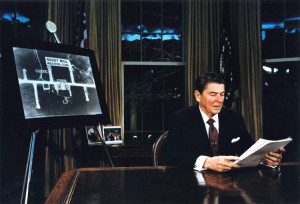
On March 23, 1983 President Reagan unveiled SDI, the strategic defense initiative, which some say bankrupted the Soviet Union.
David: North Korea claims to be building an ICBM that could reach Alaska. How close are they to building an ICBM that could actually hit us?
Hayes: Good question. It depends on how much you believe what they say. According to North Korea, they’re really close, but many of the models of the design that would be the ICBM to reach us are actually fake. The ones they tout around and parade, they’re not actually real. They’re very, very clever models. So it’s a toss-up and that’s, again, one of the scariest things about North Korea. It’s so hard to know what’s real and what’s not.
David: Well, it’s also hard to know what’s real and what’s not with the United States. Because I read now that President Obama is installing his anti-ballistic missile system in the Pacific to shoot a North Korean ICBM out of the sky, but I’ve never read of America having an anti-ballistic system that can shoot a North Korean missile out of the sky. I always hear that we’re testing these rockets that can shoot other rockets out of the sky, but they never seem to work. But most Americans assume we have an anti-ballistic missile system, but we don’t.
Hayes: Not a true anti-ballistic missile system in the sense of like the SDI and Star Wars and all that Reagan promised us. We do have a system called THAD, T-H-A-D, which helps you try and shoot down those missiles that they moved to Guam during the last North Korea scare last year. While they wouldn’t be able to shoot down a big boy missile, they are helpful in helping protect some of our assets in the region.
David: ‘Helpful in protecting our assets in the region.’ Because I always read about how moving our ABM system from Eastern Europe to the Persian Gulf and now to Guam and I keep looking for proof that we actually have the capability to shoot a missile out of the sky. I don’t see it. I know Israel has Iron Dome which works sometimes, but doesn’t really, and I remember in 1991 reading about Israel’s capabilities to shoot Saddam Hussein’s Scud missiles out of the sky, but then Bill Safire from the New York Times did some great reporting on this. He reported on the Patriot missiles. The Patriot missiles supposedly could shoot Scud missiles out of the sky and it turns out they did nothing during the First Gulf War.
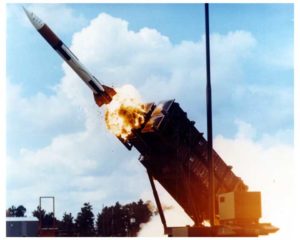
Patriot missiles are designed to shoot incoming missiles out of the sky and are made by Raytheon. During the first Gulf War we were told they protected Israel from Iraq’s Scud missiles, but later reporting by the New York Times says otherwise.
Hayes: A good part of warfare is trying to make sure the other side thinks you’re tougher than you are. On the other hand, some of these smaller systems like on the Aegis ships, which were also moved into the region during the last North Korea scare, have had some success in actually proving themselves to be a good defense system, not against the larger ICBMs, but against short and mid-ranged missiles, they have proven themselves to be pretty decent at what they do.
David: Some people have even questioned my patriotism for questioning our anti-ballistic missile defense system, because it’s telling the enemy that we’re vulnerable. But the people who were patriotic in the run-up to World War II, the French said they had a Maginot Line that was impenetrable and to question it would be unpatriotic. The French were convinced they had what amounted to an iron dome to protect them from the Nazis and Hitler said, ‘Yes, our tanks cannot penetrate the Maginot Line so we’ll just fly over it,’ which they did.
Hayes: Or go around them.
David: Yeah, they flew over it. So a false sense of security can be pretty dangerous. Do you think it’s unpatriotic to question whether or not we have an anti-ballistic missile system?
Hayes: No, not at all. I actually don’t think it’s unpatriotic to question whether they’re worth the cost. Actually they tend to be expensive systems and they do tend to require a lot of testing before they’re proven to be accurate. I’m not saying we should cut all missile defense, I’m saying that we should spend our money wisely on it.
David: Up until Reagan, we lived under ‘mutual assured destruction’ and Reagan didn’t like that idea. I don’t think anybody did. But I don’t think there’s any evidence to suggest that we can do anything after a country has nuclear capability. Once they have missiles I think it’s a stalemate.
Hayes: For the most part, until there’s either a change of government or there’s a change of heart. I mean there have been instances in the past where governments have given up the bomb. South Africa gave up the bomb, Brazil was close and they stopped all pursuit of it after their right-wing dictatorship fell. So it’s entirely possible to see some future where North Korea is able to give up it’s nuclear weapons, but that time is not in the near future unfortunately.
David: Right. But I’m talking about the efficiency of our alleged anti-ballistic missiles. If we had anti-ballistic missiles that worked, then we wouldn’t be so afraid of Iran enriching uranium.
Hayes: Right. Our missile-defense systems aren’t necessarily designed to be anti-ballistic missiles. The big threat is the long-range, the intercontinental ones that Iran doesn’t have capability of yet, North Korea does not have the capability of yet. So what we do have though is the ability to shoot down some of these smaller short and mid range missile systems and that’s what we’re really seeing moved into place and what we see Russia getting all up into arms in eastern Europe and what we see moving into position whenever North Korea raises their hackles.
David: Okay. I would love to see any proof of that because I follow what goes on in Israel and the Iron Dome and those rockets that Hamas fires from the Gaza Strip into southern Israel . . .
Hayes: Right, no one thinks that any defense system is ever going to have a 100% success rate, but compared to what the damage would have been without Iron Dome, I think it’s doing its job pretty decently. And I think that’s the theory with most of these defense systems that we see in place regarding North Korea, that 100% stoppage is not possible, but it’s better than 0% and I think we’re above that point.
David: Right. The Patriot missiles, during the First Gulf War, had 0% accuracy according to Bill Safire of the New York Times. They achieved absolutely nothing, but we were fed a lie that our Patriot missiles had come to Israel’s rescue when Saddam Hussein was lobbing the Scuds there and we later learned that the Patriot missiles don’t work, but there was a lot of money to be made.
Hayes: I haven’t read that Safire piece, so you know more than me on this one.
David: Well, I find that really interesting, and I’m not trying to be arrogant here.

New York Times Columnist Bill Safire, seen here getting the Presidential Medal of Freedom, wrote a series of articles questioning whether or not the Patriot missiles actually did what they were supposed to during the first Gulf War.
Hayes: No, it’s fine.
David: Because nobody has. But I remember the Gulf War, I remember Benjamin Netanyahu wearing a gas mask, he was the spokesman for Israel at the time. He was praising America for saving Israel and how great the Patriot missile was that was shooting these evil Scuds out of the sky. And then a couple of months later, Bill Safire, a conservative, looked into it and said the Patriot missile did absolutely nothing to prevent the Scud missiles from landing on Israel and that story kind of got buried. It’s even hard to Google and find. If you look for it, kind of hard to find. And I wonder, so there’s misinformation coming from North Korea and there’s misinformation coming from the United States when it comes to these missile programs. And I say this as a patriot, not as an investor in the Patriot missile, but I do say this as somebody who loves America and knows that the Maginot Line, that false sense of security, can be very dangerous.
Hayes Brown covers national security issues for ThinkProgress.org.
Listen to the original broadcast
What do you think? Can America shoot missiles out of the sky? Is this a capability we should pursue, no matter what the cost is? I’d like to hear your ideas. Please make your voice heard by leaving your comments below.
